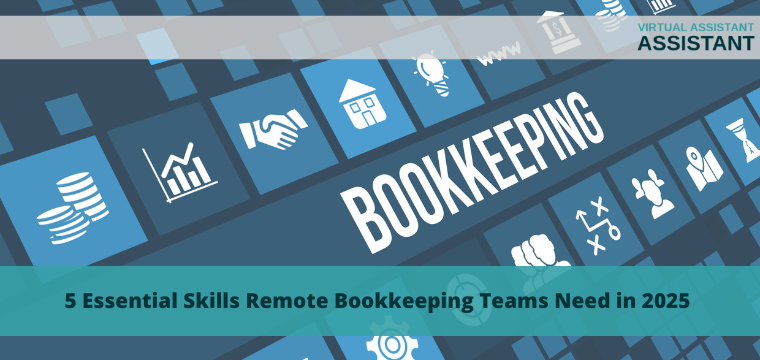 5 Essential Skills Remote Bookkeeping Teams Need in 2025
5 Essential Skills Remote Bookkeeping Teams Need in 2025
In 2025, remote bookkeeping isn’t just data entry in pajamas. It’s real-time finance, tech-savvy moves, and smart strategy from anywhere on the map.
Businesses now want bookkeepers who don’t just record numbers—they want pros who can read between the lines, spot risk, and automate the grind before it starts.
If your team’s only fluent in spreadsheets, you’re already behind. The top virtual finance pros are blending compliance smarts, AI know-how, and client-first thinking like it’s second nature.
Here’s what it takes to stay booked, trusted, and untouchable in 2025.
Table of Contents
1. Compliance and Regulatory Awareness
Financial regulations aren’t softening for digital teams. In fact, more scrutiny is landing on remote-first businesses. As a result, bookkeepers must understand the implications of global compliance requirements and shifting tax codes. The basics of GAAP or IFRS still apply, but so does knowledge of digital sales tax thresholds, data privacy laws like GDPR, and sector-specific reporting obligations.
If a remote team is serving clients in multiple states or countries, someone on the team must understand registration triggers, document retention timelines, and the distinction between bookkeeping and regulated financial reporting.
Investing in team members who are accredited, or even partially CPA-qualified, adds credibility and strategic muscle. According to current CPA income statistics, the average salary range for CPAs reflects their high value and recruitment demand. For small virtual teams, even one accredited advisor can elevate client trust and service scope.
 2. Deep Tech Fluency Beyond the Basics
2. Deep Tech Fluency Beyond the Basics
Spreadsheets and accounting software were just the opening act. Today’s virtual bookkeepers need to navigate an increasingly complex ecosystem of integrated tools and automation platforms. That includes more than knowing how to log in or run a report. It means working with APIs, setting up automated workflows, and understanding how platforms connect to CRM systems, inventory apps, and payment processors.
For example, if a client uses Shopify, Stripe, and HubSpot, the bookkeeping team should be able to monitor syncing issues, verify reconciliation workflows, and flag duplicate data across platforms. This type of fluency cuts down on manual work and helps the team provide more proactive insights.
Other must-knows include using secure password managers, collaboration hubs like Notion or ClickUp, and getting comfortable with browser extensions that improve workflow visibility. In short: if a tool saves time and improves accuracy, a skilled bookkeeper in 2025 knows it and uses it.
3. Real-Time Communication and Asynchronous Mastery
In a remote environment, communication isn’t just about sending messages quickly. It’s about context, clarity, and timing. The best bookkeeping teams treat communication like part of their deliverables. That means using async tools not just to check in, but to move projects forward.
Remote bookkeepers who thrive know how to:
- Summarize financial findings concisely in a recorded video
- Flag anomalies with screen-shared walkthroughs
- Update checklists that reduce manager follow-up
- Provide weekly updates without needing a live call
This level of structured transparency cuts through the typical delays caused by email chains or vague task updates. It also helps virtual finance teams scale without losing quality or trust.
4. Financial Storytelling and Advisory Support
Bookkeeping isn’t just about balancing numbers. In 2025, it’s about helping clients understand what those numbers mean. The ability to communicate financial performance in plain language, offer commentary on trends, and recommend actionable changes is one of the fastest-growing expectations in the field.
This skill blends financial analysis with communication. A strong virtual bookkeeper can:
- Build visuals that connect cash flow patterns to business goals
- Interpret changes in expense ratios or seasonal trends
- Translate monthly reports into talking points for non-financial founders
- Help clients prepare for investor meetings or funding applications
Not every remote bookkeeper needs to double as a CFO, but clients are increasingly looking for someone who can tell them what the numbers say and what they should do next. If your team can do this well, you’re positioned as a strategic partner, not just a line-item tracker.
5. Cybersecurity as a Daily Habit
With cyber threats evolving faster than most accounting curricula can adapt, cybersecurity isn’t just the IT department’s job anymore. Remote bookkeepers have direct access to sensitive data, which makes them frontline defenders of client confidentiality.
That means developing habits around:
- Using two-factor authentication on all software
- Verifying client requests to prevent fraud
- Securely managing document transfers and access permissions
- Watching for phishing attempts or social engineering tactics
- Keeping systems updated and encrypted
Even if your team isn’t large enough to have a dedicated IT lead, every member must be trained in cybersecurity basics. The cost of one mistake isn’t just a data breach, it’s reputational damage and possible legal fallout. Many bookkeeping services now list their security practices as a selling point, and for good reason.
The Bottom Line: Smarter, Not Just Faster
Remote bookkeeping in 2025 demands more than time tracking and report generation. Teams that succeed are technically sharp, communicative, compliance-savvy, strategic, and security-minded. The work is increasingly integrated with big-picture decision-making and client relationship building.
For business owners, investing in a skilled remote team isn’t just a cost line. It’s a competitive advantage. And for bookkeepers themselves, those who can master these five areas aren’t just surviving the shift to remote work. They’re thriving in it.
